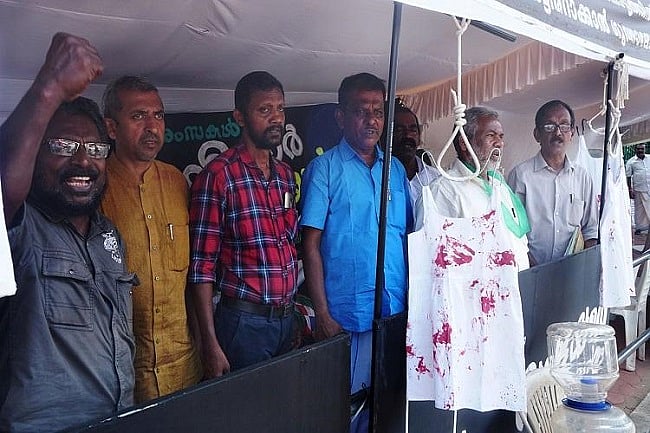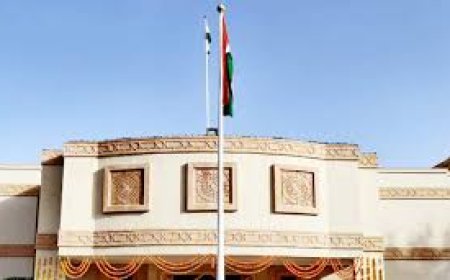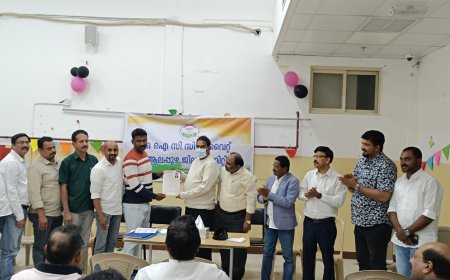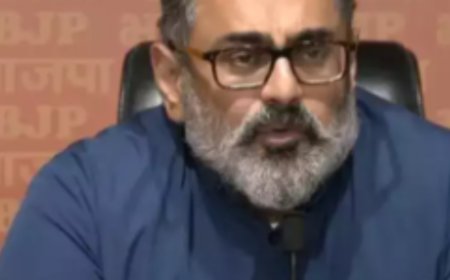Political blame games fuel ASHA workers' revolt for fair compensation
The ASHA workers’ protest in Kerala has sparked yet another debate on the state of India's grassroots healthcare workforce. Accredited Social Health Activists (ASHAs), the backbone of India's public health system, are once again on the streets, demanding fair compensation, job security, and basic working conditions. The question that looms over this movement is not just whether their demands are justified—they clearly are—but why these issues persist despite years of agitation. The core of the crisis lies not only in the reluctance to address their demands but in the sheer irresponsibility of both the state and Union governments in resolving an issue that should never have escalated into a protest.From the outset, this protest has laid bare the governance failures at multiple levels. Both the state and Union governments have engaged in blame games, shifting responsibility instead of delivering concrete solutions. It is not the duty of ASHA workers to untangle bureaucratic confusion or force governments to function efficiently. That is precisely why elected representatives exist—to address grievances, not to evade them.The 20 demands raised by ASHA workers outline specific actions required, and they leave no room for ambiguity on which government must act.Demands under the responsibility of the Kerala government1. Withdraw the order to dismiss ASHA workers at 62 years of age: The Kerala government decides employment conditions, and it has the sole authority to revoke the directive forcing retirement at 62. Many ASHA workers have dedicated decades to healthcare service, and forced dismissals without retirement benefits are unjust.2. Provide Rs 5 lakh as retirement benefits (similar to West Bengal): Since the National Health Mission (NHM) does not cover retirement benefits, state governments must independently formulate pension plans. Kerala has the power to implement such a scheme.3. Make ASHA workers with 16 years of service permanent health department employees: ASHAs are currently considered voluntary workers, denying them job security. The Kerala government can change their employment status, ensuring dignity in service.4. Withdraw stringent honorarium criteria: The state government determines the eligibility criteria for ASHA workers' honorarium. These stringent rules, which previously disqualified many from benefits, were unnecessary in the first place.5. Issue new ID cards with the NHM emblem and standardised uniforms: This is a basic administrative measure that falls under Kerala's jurisdiction. The absence of uniform identification hampers their work and recognition.6. Provide medical assistance for work-related accidents and posthumous benefits: The state government is responsible for ensuring healthcare worker compensation. A lack of financial assistance for ASHAs injured in the line of duty reflects poorly on Kerala's healthcare commitments.7. Ensure free treatment for ASHA workers in government hospitals, including medical colleges: This is a matter of state health policy, and Kerala has the authority to grant this benefit to ASHA workers.8. Prevent unnecessary transfers and allow ASHAs to remain in their original wards: Forced transfers cause unnecessary disruptions and personal hardship. This is an issue controlled by the Kerala government.9. Reduce workload and exempt ASHA workers from duty on Sundays: The government controls scheduling and must recognise that healthcare workers are not machines. They deserve adequate rest.10. Avoid assigning constant surveys and ensure timely payment for survey work: Many additional surveys assigned to ASHA workers fall outside the NHM’s mandate. Kerala should either compensate them fairly or stop using them as unpaid data collectors.11. Provide smartphones for ASHA operations. Digital data entry is becoming a crucial part of their work, so smartphones must be recognised as essential work tools and provided by the state.12. Increase phone recharge allowance in proportion to cost hikes: Phone allowances are decided at the state level, and Kerala has neglected to revise them to keep pace with rising costs.13. Appoint new ASHA workers instead of overburdening existing ones: Overwork is a crisis in the ASHA workforce, and recruitment is the only solution. Kerala must immediately conduct new hiring drives.14. Stop mandatory participation of ASHAs in government events: ASHA workers are healthcare professionals, not event staff. Kerala has repeatedly misused them in non-health-related public programs.15. Restrict ASHA workers’ duties to healthcare alone and exclude them from panchayat activities: ASHAs should not be burdened with tasks that fall outside their healthcare role. Kerala has a responsibility to ensure their work remains within the health sector.16. Exempt ASHA workers from identifying the extremely poor: Assigning ASHAs survey work outside their job profile is exploitative. The Kerala government must stop this practice. Demands under the responsibility o

THE ASHA workers’ protest in Kerala has sparked yet another debate on the state of India's grassroots healthcare workforce.
Accredited Social Health Activists (ASHAs), the backbone of India's public health system, are once again on the streets, demanding fair compensation, job security, and basic working conditions.
The question that looms over this movement is not just whether their demands are justified—they clearly are—but why these issues persist despite years of agitation.
The core of the crisis lies not only in the reluctance to address their demands but in the sheer irresponsibility of both the state and Union governments in resolving an issue that should never have escalated into a protest.
From the outset, this protest has laid bare the governance failures at multiple levels. Both the state and Union governments have engaged in blame games, shifting responsibility instead of delivering concrete solutions.
It is not the duty of ASHA workers to untangle bureaucratic confusion or force governments to function efficiently. That is precisely why elected representatives exist—to address grievances, not to evade them.
The 20 demands raised by ASHA workers outline specific actions required, and they leave no room for ambiguity on which government must act.
Demands under the responsibility of the Kerala government
1. Withdraw the order to dismiss ASHA workers at 62 years of age: The Kerala government decides employment conditions, and it has the sole authority to revoke the directive forcing retirement at 62. Many ASHA workers have dedicated decades to healthcare service, and forced dismissals without retirement benefits are unjust.
2. Provide Rs 5 lakh as retirement benefits (similar to West Bengal): Since the National Health Mission (NHM) does not cover retirement benefits, state governments must independently formulate pension plans. Kerala has the power to implement such a scheme.
3. Make ASHA workers with 16 years of service permanent health department employees: ASHAs are currently considered voluntary workers, denying them job security. The Kerala government can change their employment status, ensuring dignity in service.
4. Withdraw stringent honorarium criteria: The state government determines the eligibility criteria for ASHA workers' honorarium. These stringent rules, which previously disqualified many from benefits, were unnecessary in the first place.
5. Issue new ID cards with the NHM emblem and standardised uniforms: This is a basic administrative measure that falls under Kerala's jurisdiction. The absence of uniform identification hampers their work and recognition.
6. Provide medical assistance for work-related accidents and posthumous benefits: The state government is responsible for ensuring healthcare worker compensation. A lack of financial assistance for ASHAs injured in the line of duty reflects poorly on Kerala's healthcare commitments.
7. Ensure free treatment for ASHA workers in government hospitals, including medical colleges: This is a matter of state health policy, and Kerala has the authority to grant this benefit to ASHA workers.
8. Prevent unnecessary transfers and allow ASHAs to remain in their original wards: Forced transfers cause unnecessary disruptions and personal hardship. This is an issue controlled by the Kerala government.
9. Reduce workload and exempt ASHA workers from duty on Sundays: The government controls scheduling and must recognise that healthcare workers are not machines. They deserve adequate rest.
10. Avoid assigning constant surveys and ensure timely payment for survey work: Many additional surveys assigned to ASHA workers fall outside the NHM’s mandate. Kerala should either compensate them fairly or stop using them as unpaid data collectors.
11. Provide smartphones for ASHA operations. Digital data entry is becoming a crucial part of their work, so smartphones must be recognised as essential work tools and provided by the state.
12. Increase phone recharge allowance in proportion to cost hikes: Phone allowances are decided at the state level, and Kerala has neglected to revise them to keep pace with rising costs.
13. Appoint new ASHA workers instead of overburdening existing ones: Overwork is a crisis in the ASHA workforce, and recruitment is the only solution. Kerala must immediately conduct new hiring drives.
14. Stop mandatory participation of ASHAs in government events: ASHA workers are healthcare professionals, not event staff. Kerala has repeatedly misused them in non-health-related public programs.
15. Restrict ASHA workers’ duties to healthcare alone and exclude them from panchayat activities: ASHAs should not be burdened with tasks that fall outside their healthcare role. Kerala has a responsibility to ensure their work remains within the health sector.
16. Exempt ASHA workers from identifying the extremely poor: Assigning ASHAs survey work outside their job profile is exploitative. The Kerala government must stop this practice.
Demands under the responsibility of the Union government
17. Increase honorarium and incentives, and ensure salaries are paid by the 5th of every month: The Union government provides Rs 2,000 per month, which is a disgracefully low sum. While Kerala adds Rs 7,000 extra, both governments must work together to ensure fair compensation.
18. Increase incentives over time: The NHM determines incentive structures, which have remained stagnant for years. The Union government must ensure regular revisions in pay scales.
19. Pay wages for pulse polio preparation days and increase the daily wage to Rs 600: The Union government entirely funds pulse polio work, so it is responsible for ensuring fair pay.
20. Establish clear work standards and ensure ground-level implementation: The Union government sets NHM guidelines, but states implement them. It must introduce clarity to avoid confusion and discrepancies between states.
Preventing political posturing: The need for transparency
Beyond the specifics of these demands, the broader issue is one of accountability. The ongoing strike has been plagued by political narratives that shift blame between the state and Union governments.
This kind of misdirection detracts from the core issues and misleads the public into believing that one government alone holds all the responsibility. To prevent such politicisation, both governments must publish clear data through formal government channels.
Information on honorariums, employment policies, and financial allocations should be made publicly available to ensure transparency. When one side withholds information or distorts facts, it leads to misinformation, making it harder for ASHA workers to negotiate fair terms.
Furthermore, clear communication from both levels of government is crucial in ensuring that the public understands the structural challenges behind ASHA workers' demands.
The Union government must be explicit about the extent of its financial and policy responsibilities, while the Kerala government must clarify what measures it can implement independently. Such clarity would prevent political posturing and ensure that ASHA workers’ genuine grievances are addressed without becoming mere talking points in a larger partisan battle.
Double standards in government promises
The political hypocrisy surrounding ASHA workers’ protests is hard to ignore. The CPI(M), which leads the Kerala government, has been vocal about workers’ rights in other states.
In Assam, ASHA workers, alongside Anganwadi workers, have been protesting under CITU-affiliated organisations, demanding recognition as full-fledged workers, salaries instead of honorariums, pension schemes, and infrastructure improvements.
The CPI(M) has supported these protests elsewhere, yet when faced with similar demands where they are the ruling dispensation, the response has been strikingly different. It is a textbook case of selective outrage—endorsing protests in opposition-ruled states while resisting them in one’s own backyard.
It is not just Kerala—governments across party lines have failed ASHA workers. The Union government, while championing welfare schemes, has also continuously underpaid and overburdened ASHAs. Despite being essential to India’s healthcare system, they are denied even basic job protections.
While progress has been slow, some demands have been addressed since the protests began. The Kerala government recently cleared three months' worth of pending honorarium payments and withdrew 10 stringent eligibility criteria for receiving the honorarium.
However, these changes were made only after intense pressure and public scrutiny. If such protests had not occurred, these reforms would likely have never happened.
The expanding movement: Anganwadi workers join the struggle
Inspired by ASHA workers, Anganwadi workers have also intensified their protests, highlighting similar grievances regarding poor wages, lack of benefits, and job insecurity.
The growing unrest among grassroots healthcare workers is a direct consequence of government negligence. If both state and Union governments fail to act now, they risk facing a far larger workers’ uprising shortly.
The ASHA workers’ protest is more than just a fight for fair wages—it is a fight for dignity, recognition, and systemic reform. Their demands are clear, their struggle is justified, and the government’s inaction is indefensible.
While the Kerala and the Union governments continue their political blame game, the real victims are the very workers who sustain the public healthcare system. The growing unrest, now extending to Anganwadi workers, signals a broader crisis in the treatment of grassroots health workers.
If governments at all levels do not act decisively, they risk not only the collapse of crucial health services but also a loss of public trust. Transparency, accountability, and immediate action are the need of the hour—not more empty promises.
A government that fails its frontline workers ultimately fails its people. ASHA workers do not seek charity; they demand what is rightfully theirs. It is time for those in power to listen, act, and be held accountable for the promises they have made—and broken.
Nabeel Kolothumthodi is a Parliamentary Secretary to a Member of Parliament, Lok Sabha and an alumnus of the University of Delhi's Faculty of Law. He holds a legal fellowship at the Governance Innovation Lab and writes on matters of social and political importance. Views expressed here are the author’s own.




































































